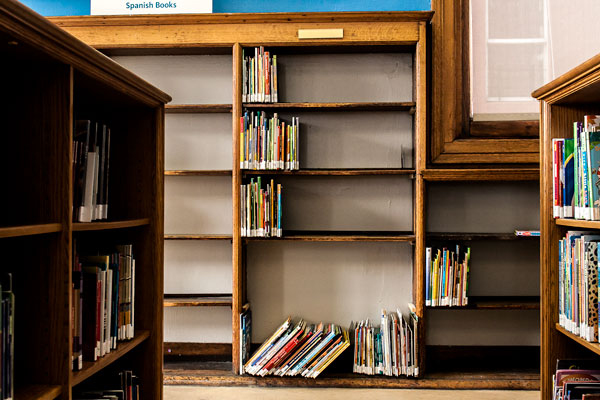Canadian Politics, Culture, Literature
Ontario school board eliminates all library books published before 2008. That’s just a start.
I am not at all surprised to find out that the library of Erindale Secondary School in Mississauga was nearly empty when school started due to new policies eliminating much of the selection—including getting rid of everything published prior to 2008. I am very surprised that the CBC broke the story. From their report:
Harry Potter, The Hunger Games and Roll of Thunder, Hear My Cry. Those are all examples of books Reina Takata says she can no longer find in her public high school library in Mississauga — which she visits on her lunch hour most days. In May, Takata says the shelves at Erindale Secondary School were full of books, but she noticed that they had gradually started to disappear. When she returned to school this fall, things were more stark.
“This year, I came into my school library and there are rows and rows of empty shelves with absolutely no books,” said Takata, who started Grade 10 last week. She estimates more than 50 per cent of her school’s library books are gone. In the spring, Takata says students were told by staff that “if the shelves look emptier right now it’s because we have to remove all books [published] prior to 2008.”
Takata is one of several Peel District School Board (PDSB) students, parents and community members CBC Toronto spoke to who are concerned about a seemingly inconsistent approach to a new equity-based book weeding process implemented by the board last spring in response to a provincial directive from the Minister of Education. They say the new process, intended to ensure library books are inclusive, appears to have led some schools to remove thousands of books solely because they were published in 2008 or earlier.
Ontario’s education minister has called for a halt to the book purge, and the school is of course insisting that “weeding books” is a normal process. Which, of course, it is—I built much of my own personal library going to library book sales, where bags of books could be purchased for a few bucks. But these were not being weeded by date. The board’s defence of this policy did not, as you might imagine, assuage concerns about what is going on:
“Books published prior to 2008 that are damaged, inaccurate, or do not have strong circulation data (are not being checked out by students) are removed,” said the board in its statement.
If damaged books have strong circulation the board says they can be replaced regardless of publication date, and older titles can stay in the collection if they are “accurate, serve the curriculum, align with board initiatives and are responsive to student interest and engagement.”
“The Peel District School Board works to ensure that the books available in our school libraries are culturally responsive, relevant, inclusive, and reflective of the diversity of our school communities and the broader society,” said the board.
CBC Toronto reviewed a copy of the internal PDSB documents Ellard’s group obtained, which includes frequently asked questions and answers provided to school staff by the board, and a more detailed manual for the process titled “Weeding and Audit of Resource in the Library Learning Commons collection.”
The documents lay out an “equitable curation cycle” for weeding, which it says was created to support Directive 18 from the Minister of Education based on a 2020 Ministry review and report on widespread issues of systematic discrimination within the PDSB. Directive 18 instructs the board to complete a diversity audit of schools, which includes libraries.
“The Board shall evaluate books, media and all other resources currently in use for teaching and learning English, History and Social Sciences for the purpose of utilizing resources that are inclusive and culturally responsive, relevant and reflective of students, and the Board’s broader school communities,” reads the directive.
In 2023, what does it mean for a novel to be “inclusive, culturally responsive, relevant, and reflective of students”? It isn’t surprising that those tasked with carrying out this directive might decide that rather than navigating the minefield of transphobia, heteronormativity, traditional gender roles, racial insensitivity, and colonial mindsets that make up so much of classical and modern literature, it might simply be easier to pick a date—say, three years after same-sex marriage was legalized—and eliminate everything published before then.
Even literature published in the early 2000s can be tricky, especially since our cultural revolution has gathered speed since then. J.K. Rowling’s Harry Potter series used to be considered left-wing literature—she is a devoutly pro-choice, pro-gay rights liberal who took great pleasure in announcing that beloved character Dumbledore was gay. But the difference between progressive literature and conservative literature is now apparently about a decade, because Rowling has been condemned as a transphobe and the Harry Potter franchise is now “complicated”—even “problematic.” It does not seem coincidental that the last Potter book was published in 2007, and the cut-off for acceptable literature was put at 2008.
This might be an extreme example, but it is entirely in keeping with the current ethos. In 2019, a francophone school board in Ontario, Canada, hosted a book burning to purge books perceived as offensive to indigenous people. Thirty books were burned in a “flame purification ceremony” for “educational purposes,” with the ashes being used as fertilizer to plant a tree. The symbolic gesture was just the beginning—nearly 5,000 books were taken out of libraries at thirty schools across the district and were either destroyed or tossed out. The purge included novels, encyclopedias, and Tintin, Asterix, and Lucky Luke comics (it was a problematic “imbalance of power” that indigenous people weren’t the protagonists) and was formally approved by a school commission.
Progressive educators seem consistently stunned to discover that the writers of the past did not hold the values of the present, insofar as there were no gay penguins, transgender crayons, or gender-fluid children. Thus you have Cambridge University slapping “trigger warnings” on classic children’s literature, and researchers, according to the Daily Mail, “are reviewing more than 10,000 books and magazines to expose offensive authors after campaigners demanded teachers censor racial slurs when reading Harper Lee’s To Kill A Mockingbird.” Not even a Pulitzer Prize-winning anti-racist classic can survive the new standards. And the list goes on and on—I cited many of them in my recent essay on why people should build their own private libraries.
The truth is that although the CBC and the commentators and the politicians all profess shock that a school board would take the apparently radical step of eliminating books published before 2008, nobody should be surprised. Yesteryear’s literature simply cannot keep up with the ever-evolving values of the present. The values of the past are profoundly hostile to the values of the present, and thus old literature must be either re-interpreted (thus resulting in new version of Little Women in which Jo March is a lesbian, for example), discarded—or replaced (see the SOGI curriculum’s recommended “kidlit” list, for example). The Peel Region schoolboard might have gotten a bit zealous and spooked people, but the same process is being carried out quietly in public institutions everywhere—so enjoy the outrage. It won’t last.
SUBSCRIBE TO OUR SUBSTACK HERE








